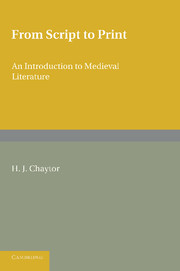Book contents
Chapter VI - Publication and Circulation
Published online by Cambridge University Press: 05 June 2016
Summary
BEFORE the invention of printing, the work of publication was performed by a special class of travelling or wandering artists, who were, in the South of France, differentiated from the poets; the performer was the joglar, the composer, the trobador.The line of demarcation between the two was not very definite; the joglar might rise to the troubadour class, if he were a man of ability; the troubadour might fall upon evil days and earn his living by performance of other men's works. Normally, the troubadour was attached to the court of some noble or settled upon his own domain, whence he sent out his joglars to present his compositions either to a particular person, or to a court or a district. The two, between them, provided amusement for the aristocratic feudal society of their time. In Northern France, the jongleur bore a name of wider meaning; he might be a composer as well as a performer, and his performance might present not merely poetry, but circus and juggling tricks, performing animals, or anything that would amuse the audience before him. Jongleurs who were definitely attached to a household or court might be known as ménestreh.
A poet's reputation was thus dependent to a large extent upon the ability of his jongleur, who was expected to learn and to perform a composition while accompanying himself upon an instrument, in the case of lyric poetry, the tune being quite as important a matter as the words. Hence poems sometimes conclude with a ‘tornada’ or envoi, urging the jongleur to do his best, or expressing fear that a bad performer may spoil the work; poems survive in which troubadours criticise in no measured terms the talents and performance of the jongleur, who was expected to perform from memory and to have a considerable repertoire at his command. Jaufre Rudel, prince of Blaye, send sa poem by his joglar, Filhol, who is not provided with a written copy:
Senes breu de parguamina
Tramet lo vers en chantan
En plana lengua romana
A.n Ugo Brun, per Filhol.
- Type
- Chapter
- Information
- From Script to PrintAn Introduction to Medieval Literature, pp. 115 - 137Publisher: Cambridge University PressPrint publication year: 2013



